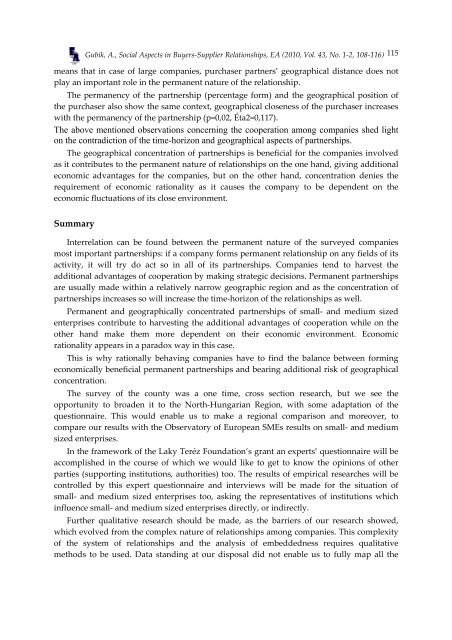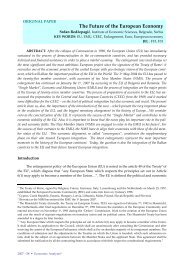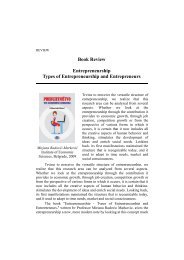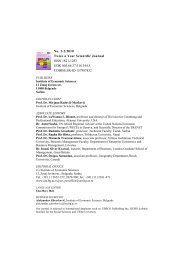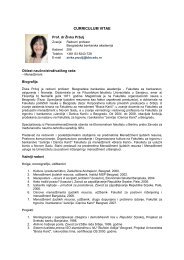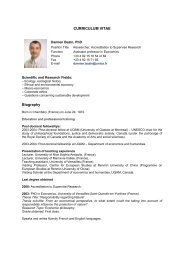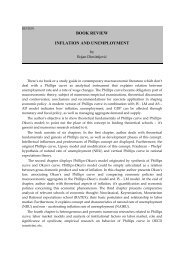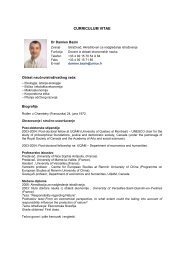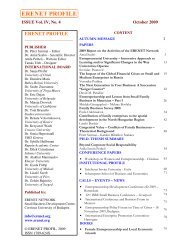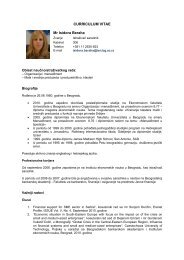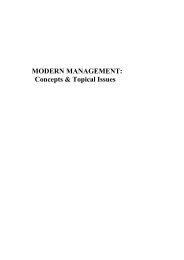Twice a Year Scientific Journal
Twice a Year Scientific Journal
Twice a Year Scientific Journal
You also want an ePaper? Increase the reach of your titles
YUMPU automatically turns print PDFs into web optimized ePapers that Google loves.
Gubik, A., Social Aspects in Buyers-Supplier Relationships, EA (2010, Vol. 43, No. 1-2, 108-116) 115<br />
means that in case of large companies, purchaser partners’ geographical distance does not<br />
play an important role in the permanent nature of the relationship.<br />
The permanency of the partnership (percentage form) and the geographical position of<br />
the purchaser also show the same context, geographical closeness of the purchaser increases<br />
with the permanency of the partnership (p=0,02, Éta2=0,117).<br />
The above mentioned observations concerning the cooperation among companies shed light<br />
on the contradiction of the time-horizon and geographical aspects of partnerships.<br />
The geographical concentration of partnerships is beneficial for the companies involved<br />
as it contributes to the permanent nature of relationships on the one hand, giving additional<br />
economic advantages for the companies, but on the other hand, concentration denies the<br />
requirement of economic rationality as it causes the company to be dependent on the<br />
economic fluctuations of its close environment.<br />
Summary<br />
Interrelation can be found between the permanent nature of the surveyed companies<br />
most important partnerships: if a company forms permanent relationship on any fields of its<br />
activity, it will try do act so in all of its partnerships. Companies tend to harvest the<br />
additional advantages of cooperation by making strategic decisions. Permanent partnerships<br />
are usually made within a relatively narrow geographic region and as the concentration of<br />
partnerships increases so will increase the time-horizon of the relationships as well.<br />
Permanent and geographically concentrated partnerships of small- and medium sized<br />
enterprises contribute to harvesting the additional advantages of cooperation while on the<br />
other hand make them more dependent on their economic environment. Economic<br />
rationality appears in a paradox way in this case.<br />
This is why rationally behaving companies have to find the balance between forming<br />
economically beneficial permanent partnerships and bearing additional risk of geographical<br />
concentration.<br />
The survey of the county was a one time, cross section research, but we see the<br />
opportunity to broaden it to the North-Hungarian Region, with some adaptation of the<br />
questionnaire. This would enable us to make a regional comparison and moreover, to<br />
compare our results with the Observatory of European SMEs results on small- and medium<br />
sized enterprises.<br />
In the framework of the Laky Teréz Foundation’s grant an experts’ questionnaire will be<br />
accomplished in the course of which we would like to get to know the opinions of other<br />
parties (supporting institutions, authorities) too. The results of empirical researches will be<br />
controlled by this expert questionnaire and interviews will be made for the situation of<br />
small- and medium sized enterprises too, asking the representatives of institutions which<br />
influence small- and medium sized enterprises directly, or indirectly.<br />
Further qualitative research should be made, as the barriers of our research showed,<br />
which evolved from the complex nature of relationships among companies. This complexity<br />
of the system of relationships and the analysis of embeddedness requires qualitative<br />
methods to be used. Data standing at our disposal did not enable us to fully map all the


